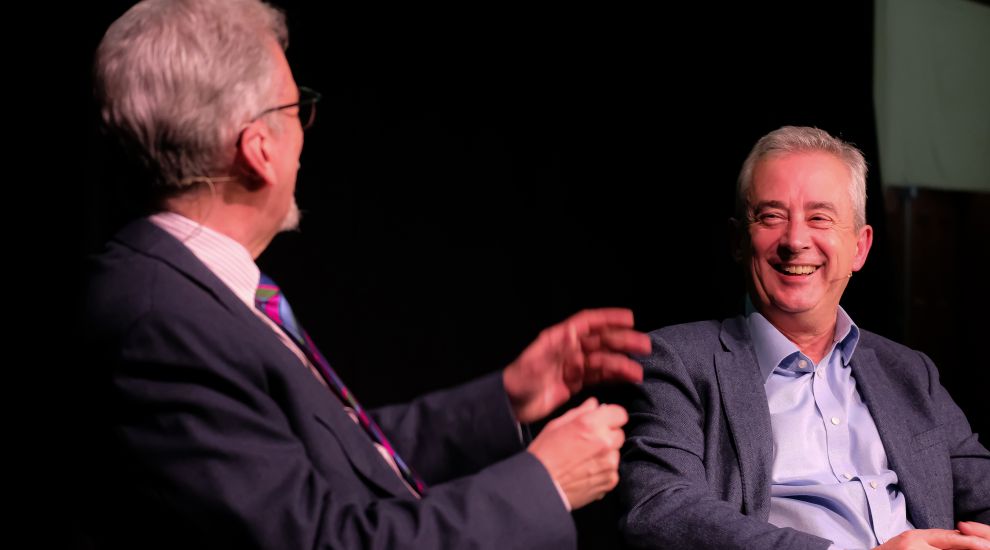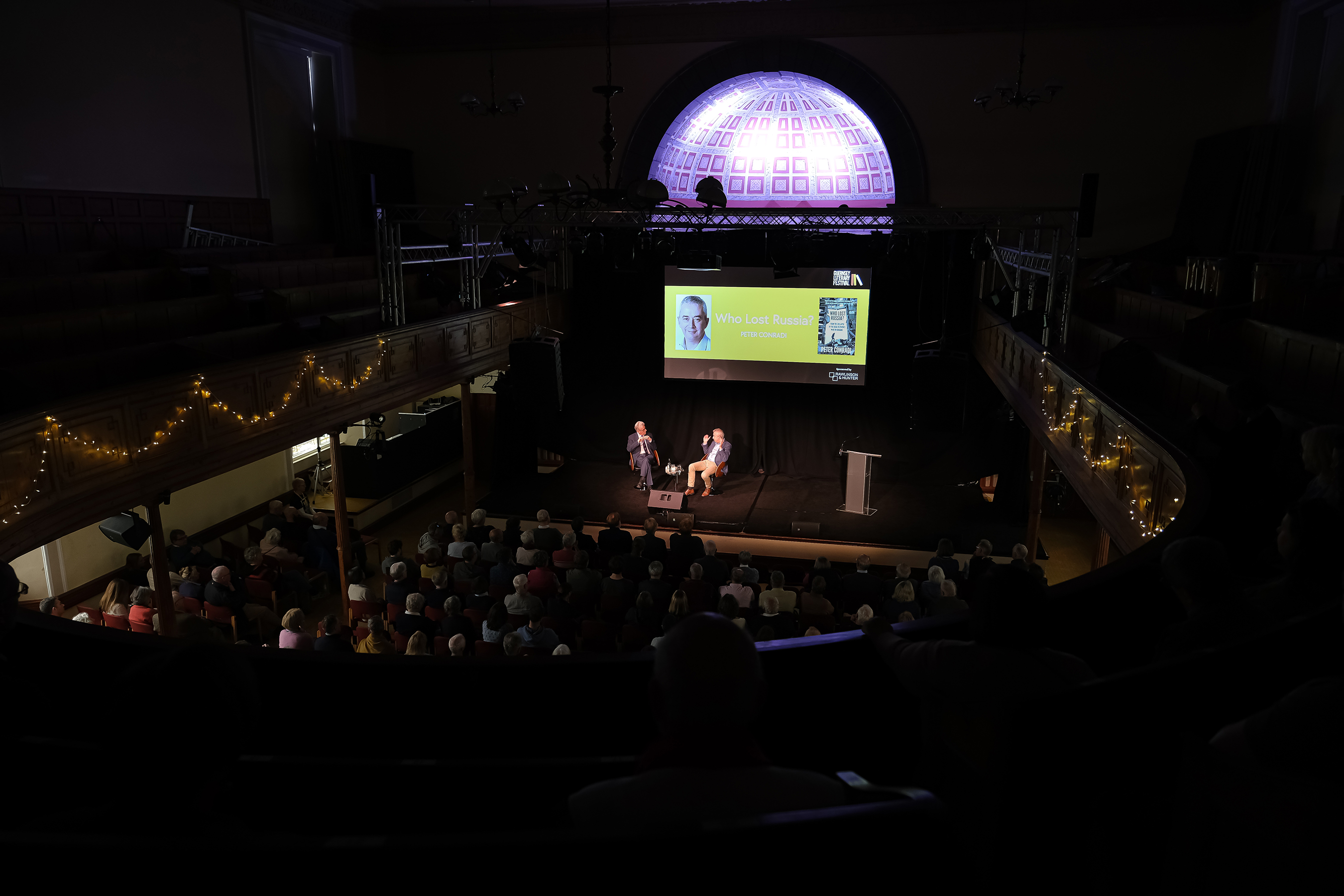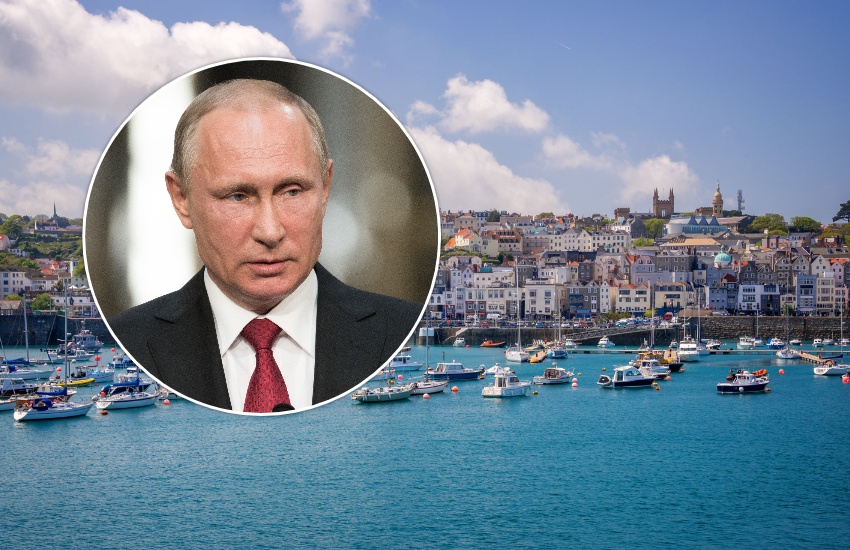


The Russian invasion of Ukraine can be traced back decades, argued journalist and historian Peter Conradi in front of an audience of hundreds who piled into St. James for the final event of the Guernsey Literary Festival 2023.
Mr Conradi recently updated his 2017 book – Who Lost Russia? – with five new chapters following Russia’s full-scale invasion of Ukraine in February 2022.
Working for Reuters, he moved to Moscow in 1986 with his wife and found himself “suddenly placed” into the collapse of the USSR.
By 1988 “things were really moving fast”, he said. Soviet President, Mikhail Gorbachev had been “loosening [political] controls gradually” throughout the country while promising greater individual freedoms. Action on the latter was not deemed fast enough by many citizens, and the pressure for change shifted from top-down to bottom-up.
Despite requests from Moscow, the G7 declined to help fund their communist to democratic transition in the early 1990s given their economic woes, according to Mr Conradi.
Once Boris Yeltsin became President of the Russian Federation there was a sudden rush to privatize the state industries – mainly based on natural resources – filling a vacuum created by Gorbachev’s lack of economic reforms.
Our final event this festival was with journalist and Europe Editor of The Sunday Times, @Peter_Conradi.
— Guernsey Lit Fest (@GuernseyLitFest) May 14, 2023
This event was chaired by journalist @GerryFoleyTV and kindly sponsored by Rawlinson Hunter. #GsyLitFest pic.twitter.com/dXtRDWZUO4
Mr Conradi argued that two small groups spotted that “large amounts of money could be made” from the sudden sell-off of state assets.
The first were those “already running the state enterprises”, while the other was generally “young, smart people who understood western economics”.
Many assets were sold at a cut price, cheating the taxpayers out of proceeds, with most of the population “left out of this process”.
The corruption, uncertainty and despair following the unexpected collapse of the USSR in 1991 and the resultant economic shock therapy gave rise to the appeal of Vladimir Putin, he added.
Mr Conradi said he was “genuinely popular at the beginning” and appeared to many Russians as “the man to reverse the period of economic depravity and national humiliation on the world stage”.
The relationship between Russia and Ukraine has long been complicated. “Ukraine is a special case for Russia,” Mr Conradi said. “Seen as one people… with no right to be another nation.”
President Yeltsin made concessions over Ukraine as he was “determined to keep power”, and to ensure that communism didn’t return.
President Putin largely “went along with western nations’” foreign policy directives throughout the early noughties, but the tone changed during one speech in 2007.
Mr Conradi said he “surprised” western leaders by saying “we’ve had enough”. President Putin lambasted the United States for intervening unnecessarily and attempting to create a unipolar world.
NATO - the western defence alliance - had been steadily enlarging further east around 2004. It also invited Ukraine and Georgia to join, but with no formal target date or mechanism set for them to join. “A messy compromise,” Mr Conradi said.
With a combination of grievance over the demise of Russia’s influence in the world and a newfound strength to act on it, Russia “felt more assertive” and began its own series of successful military interventions, starting with Georgia in 2008.
By 2010, Ukraine experienced a change of political direction with a pro-Russian President elected. But just four years later an uprising ousted the administration, and a new pro-NATO government took office. Russia then rolled in and annexed the Crimean peninsula. Putin also encouraged a pro-Russian rebellion in the east of Ukraine, spawning a civil war.
“It never stopped, and turned into this broader conflict,” Mr Conradi said. There was a huge loss of life before the invasion, and unthinkable destruction following it, he added.

Pictured: Mr Conradi delivered his talk before a packed-out St. James Hall. Credit: Jackson Chambers Photography.
He said there was “no real western kickback for that aggression”, with the question now asked being: “Had we stood up more firmly, would we be where we are today?"
Russia also later demonstrated its influence in Syria. Putin was able to turn the country into “a showroom for Russian arms,” and to “strut his stuff”. The success of that intervention can be measured by the fact Russia managed to simultaneously outmaneuver US President Barack Obama and prop up an allay, Bashar al-Assad, who remains in power today.
Mr Conradi visited Kyiv in December 2021 where he found ordinary citizens already preparing for war. “Not a question of if the Russians come, a question of when” is what people told him. He saw military drills and people taking up arms.
Mr Conradi argued that “western leaders projected their own thinking onto Putin in the run-up to war,” with many convinced, including the Ukrainian government, that an invasion was unlikely. While many nations had the same intelligence, only the United States interpreted it correctly, he said.
“It was a very vibrant, fun, great kind of city. It still is, bizarrely, between shelling and missile attacks.”

Pictured: President Putin labelled Guernsey an "unfriendly" state last year for supporting the sanctions regime against Russia following the invasion.
But what comes next? Mr Conradi believes Putin is unlikely to give up Crimea or the eastern regions which are seen as Russian. “From the Ukrainian point of view, that is completely unacceptable,” he said, with the prospect of capturing Crimea appetising.
But he questioned if the so-far resolute backing by the west can hold. “Will that hold through another winter, or a US Presidential election?”
Mr Conradi rejected suggestions that it is, or was ever, “the world against Putin”. “People don’t want to take side for a variety of reasons."
Countries like Brazil and South Africa have continued trading with Russia but have resisted joining the political argument on either side. Nevertheless, Mr Conradi said “Putin is clearly beholden to China – no doubt about it."
A significant shift in Russian leadership is unlikely as the only prominent Russian opposition figure has been imprisoned by Putin. “It’s anyone’s guess if Putin dies tomorrow,” he concluded.
The event was sponsored by Rawlinson & Hunter.
All event photography courtesy of Jackson Chambers Photography.
Comments
Comments on this story express the views of the commentator only, not Bailiwick Publishing. We are unable to guarantee the accuracy of any of those comments.